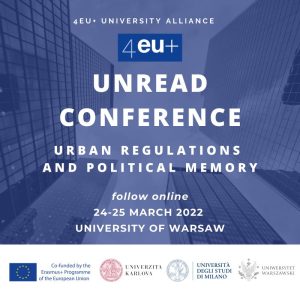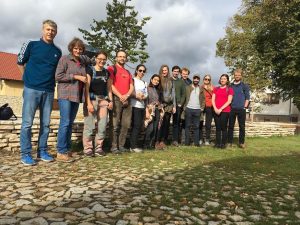A new article was published! It was written by our team leader Martin Ouředníček and Jan Kubeš from the Department of Geography of the Faculty of Geography of the University of Bohemia in České Budějovice.
The article was published in the journal Cities and is entitled “Functional types of suburban settlements around two differently sized Czech cities”.
It describes and explains the current functional differentiation of suburban settlements around two differently sized Czech cities – the capital city of Prague and the regional city of České Budějovice.
You can read the whole article here.
Congratulations on the new GAUK projects of our PhD students!
Two PhD students from our team have been successful in obtaining research funding from the University’s Grant Agency (GAUK). We congratulate them and wish them successful research!
What will they be working on?
Jiří-Jakub Zévl will work on a project entitled “Big data in the analysis of urban mobility and spatiotemporal behaviour of the population“ Dilnoza Tasheva will work on a project “Place attachment and renovation in socialist housing estates of Prague and Bishkek”4EU Course – Final Conference
Two members of our team, Martin Ouředníček and Adela Petrovic, together with three geography students, are in Warsaw for the final conference of the 4EU+ Course “Urban Regulations and Political Memory: Towards understanding Spatio-Temporal aspects of Urban Development” (UNREAD), which is one of the educational projects developed under Flagship 1.
The new promo video from the conference is out, please click here to watch it.
More information can be found here.


New article testing theories of spatial and segmented assimilation
The International Migration Review has published an article entitled “Spatial Incorporation of Multiple Immigrant Groups in Gateway Cities: Comparative Analysis of Sydney, Barcelona, and Prague” by Jiří Hasman and Ivana Křížková, which tests the theories of spatial and segmented assimilation through a comparative analysis of three different immigration cities.
The paper is based on a detailed investigation of the spatial distribution of all major migration groups in these cities, using modern quantitative methods such as spatial autocorrelation or spatial relatedness assessment of migration groups.
The results of the analyses showed that when assessing the spatial incorporation of immigrants, it is necessary to take into account not only the specificities of individual migration groups and destination cities, but also their interaction.
New article on ethnic residential segregation in Czechia (Central European cities)
Martin Šimon, Ivana Křížková and Adam Klsák have published a new article in the journal Central and Eastern European Migration Review. The article is titled New urban diversity at and after the economic downturn: recent trajectories of ethnic segregation in Central European cities. The authors focus on ethnic residential segregation in Czechia in the period after the economic crisis of 2008. Special attention is paid to the trajectories of individual cities and their position in the urban hierarchy. Longitudinal population register data are used and segregation indicators of unevenness and exposure are computed for the largest cities using a detailed spatial grid. The results show a broad picture of decreasing segregation despite the continuously growing number of immigrants in the country. While the economic crisis temporarily halted immigration, the spatial patterns of immigrant dissimilarity did not change and more-established immigration gateway cities experienced an increase in spatial isolation. In the conclusion, the article calls for further discussion on ethnic residential segregation in post-socialist cities.
New chapter on the impact of social frontiers on crime rates
A new book in full open access has just been published. It is entitled Urban Inequality and Segregation in Europe and China: Towards a New Dialogue and it was edited by Gwilym Pryce, Ya Ping Wang, Yu Chen, Jingjing Shan and Houkai Wei.
The book brings together leading international researchers from Europe, USA and China- It offers fresh ideas, cutting edge methods and analysis through comparative studies. Moreover, it provides readers with access to self-study training materials and data.
Most importantly, there is a chapter written by our team member Ivana Křížková and Meng Le Zhang, Dan Olner, Gwilym Pryce entitled Social Frontiers: Estimating the Spatial Boundaries Between Residential Groups and Their Impacts on Crime.
What is the chapter about?
This chapter highlights the importance of social frontiers—sharp spatial divisions in the residential make-up of adjacent communities—as a potentially important form of segregation. The handful of studies estimating the impacts of social frontiers have been based in the USA and the UK, both of which are free-market democracies with a long history of immigration, ethnic mix and segregation. There are currently no studies of social frontiers in former socialist countries, for example, or in countries where immigration and ethnic mix are only a recent phenomenon or non-existent. This chapter aims to address this research gap by estimating the impacts of social frontiers on crime rates in a post-socialist country, Czechia. We demonstrate how a Bayesian spatial conditional autoregressive estimation can be used to detect social frontiers in this setting, and we use a fixed effect quasi-Poisson model to investigate the impact on crime. Our results suggest that in new immigration destinations, social frontiers may not be associated with higher rates of crime, at least in the short run. Moreover, our use of cultural distance measures helps to promote a more nuanced approach to studying the impact of segregation and highlights the role of cultural diversity in understanding the link between immigrant segregation and crime. We reflect on how this approach could contribute to the study of segregation and inequality in the Chinese context.New article focusing on future residential mobility and strategies for later-life suburban households
In the last few days, an article was published in an impact journal Geografisk Tidsskrift-Danish Journal of Geography entitled Retiring in the suburbs? Residential strategies in two Prague suburbs. The authors are Nina Dvořáková and Marie Horňáková. In an attempt to analyse future residential mobility and strategies for later-life suburban households in Czechia, they conducted a questionnaire survey in two suburban municipalities (n = 177). Respondents were aware that as they aged, their current residences and residential environments were likely to become less suitable. Nevertheless, most of our respondents were “stayers” and employed various assimilative coping strategies to adapt their homes, rather than moving or leaving the suburbs.
We went on a teambuilding!
In October, after a long time, we went on a teambuilding trip together as a team. We walked through the beautiful countryside (Protected Landscape Area Bohemian Karst) from Serbia (located in the Central Bohemian region) to Beroun and recharged our energy. Hopefully, the situation will allow it and we will be able to go somewhere next year! More photos here.


New article focusing on residential mobility of young families
In the last few days, an article was published in an impact journal Norsk Geografisk Tidsskrift – Norwegian Journal of Geography entitled “From suburbanization to reurbanization? Changing residential mobility flows of families with young children in the Prague Metropolitan Area”. The authors are Marie Horňáková and Jan Sýkora. The aim of the article is to examine changes in the residential mobility patterns of families with young children living in and moving between different residential zones in the Prague Metropolitan Area. Migration data relating to individuals are used to examine spatial and temporal shifts in mobility flows. Even though suburbs are still the main destination for families with young children, the authors identified a certain degree of diversification in residential behaviour. They conclude that this finding points to the emergence of reurbanization tendencies towards the housing estates and intensifying mobility within residential zones with housing that is similar in appearance.
NAKI Project: New specialised maps are ready
The NAKI project focusing on Prague suburbs continues successfully!
In September, the 3rd and 4th set of specialised maps were completed and published, dealing with the growth of selected neighbourhoods in the socialist period (Strašnice, Kobylisy, Hlubočepy, Jižní Město, Černý Most, Modřany) and the growth of suburbs in the transformation period (Jesenice, Dobřichovice, Dolní Břežany, Hostivice).
All maps together with analytical texts are available here.